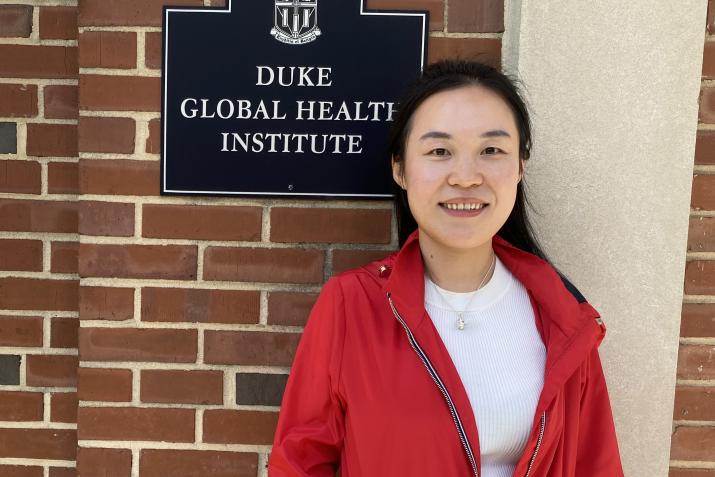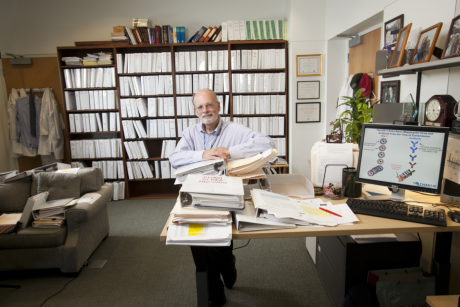Melinda (Shu) Chen remembers when she first felt the pull to learn more about health inequities. She was a student at Peking University, and she had gone for a doctor appointment at a top-tier hospital in Beijing. While in the waiting room, she noticed a woman begging for medical care. The woman said she had traveled a great distance, but without an appointment she was turned away. She refused to leave, and eventually security guards removed her from the building.
“It provoked me to think about the limited high-quality health resources China has and how inaccessible they are for common people,” says Chen, who had just started medical studies at the time. “That’s what triggered my interest.”
It’s a path Chen has stayed on since. A 2014 graduate of the Duke Master of Science in Global Health program, she is now pursuing a Ph.D. at the University of New South Wales in Australia. She also serves as deputy director of the Innovation Lab for Vaccine Delivery Research (VaxLab), a project housed at Duke Kunshan University. Led by Duke Global Health Institute professor Shenglan Tang, M.D., the lab is working to strengthen vaccine coverage and delivery in China.
While at Duke as a visiting scholar, Chen spoke with DGHI about her work on the vaccine project, as well as her new research focus on ways to predict and prevent dementia.
For you, enrolling in the MS-GH program was an example of, “It’s a small world,” right?
I chose Duke after speaking with Xiaochen Dai MS’13. He went to Peking University with me. He introduced me to the program, told me how supportive the faculty and staff are for students, and that I would have the chance to do field work. Now, we are collaborators and have published a paper on the burden of age-related diseases.
Why have you chosen to focus much of your work so far in China?
I’m from Chengdu, the capital of the Sichuan province, and my family lives there. China is ranked high for its economy, but there are huge economic and health disparities across regions. Many people in Beijing and Shanghai have access to quality health and educational resources. But if you look at smaller cities and rural areas in Western China, people are still struggling. I still have deep connections there because it’s my home, and my family members live on this land.
What are some of your responsibilities in the VaxLab?
I assist Tang with overseeing the lab’s operation and management, and I co-lead efforts producing policy briefings and organizing technical workshops. Also, we publish relevant papers on strengthening China’s National Immunization Program, and our work was shared by media outlets in the country. Because of that and policy advocacy, China is looking to expand its immunization program.
What has working in the lab taught you?
A lot. Previously, my knowledge about vaccines was limited, but now I see vaccines as cost-effective health interventions and how important it is for children to get life-saving vaccinations. I’ve done research on tuberculosis and heart diseases, and I found there are similar issues from the health system perspective, such as regional disparities in health services and a shortage of health workforce.
You’re in your final year of your Ph.D., studying population aging and long-term care issues. Where did this shift in your research come from?
Population aging is a big social issue in many countries – including China in the past decade, with increasing longevity and decreasing fertility. How to meet the increasing demand of health and long-term care resources for [more] older people in the aging society is challenging.
My grandpa had dementia and passed away in 2020. He was very close to me. I saw him lose his memory, and he struggled with the disease until he died. My Ph.D. is studying how social environments, genetic risk, and lifestyle can determine dementia.
What do you want to share with global health students about your experiences?
My advice is it’s OK if you don’t know what you want to do after graduation, but never stop trying. Try and see what you like, and don’t constrain yourself. I wasn’t sure about what I wanted to do after graduating from DGHI. Some of my classmates applied for Ph.D. programs, went to work in the health care industry or for NGOs. I worked at the Global Health Research Center at Duke Kunshan University for four years, and then at the Beijing Office for FHI 360 and when I wanted to try something new, I worked as a consultant for the World Bank. Now, I am clear that my interest is in academia. I want to dedicate my life to reducing health inequity.



